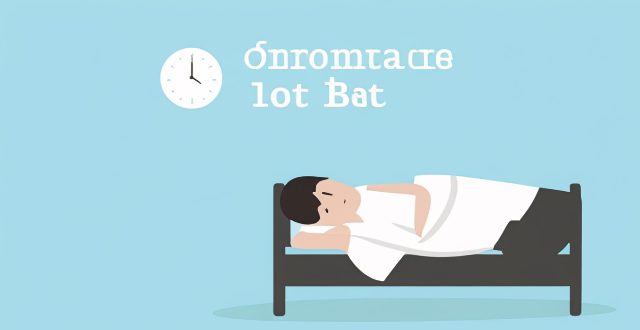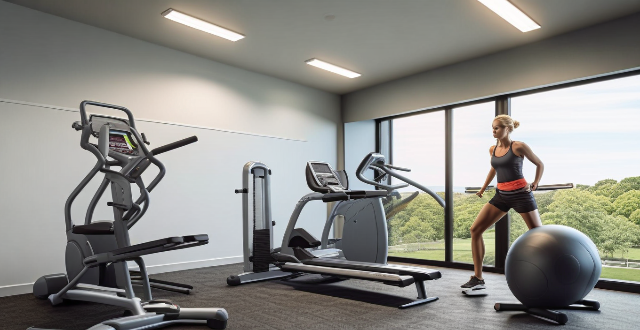Sleep Insomnia

Can regular exercise help with insomnia ?
Insomnia, a sleep disorder making it hard to fall or stay asleep, affects many. Regular exercise is emerging as a natural remedy for insomnia. Exercise can positively impact sleep quality and duration by regulating the circadian rhythm and releasing endorphins. It also reduces stress and anxiety, leading causes of insomnia. Regular exercise boosts energy levels and mental health, further promoting better sleep. The recommended amount is 150 minutes of moderate-intensity activity weekly, including muscle-strengthening exercises. Tips for exercising with insomnia include choosing low-impact activities, avoiding high-intensity workouts at night, establishing a routine, being mindful of caffeine intake, and consulting a doctor before starting an exercise program.

How does shift work impact sleep patterns, and what can be done about it ?
Shift work can significantly disrupt sleep patterns due to conflicts with the natural circadian rhythm. Strategies for managing sleep disruptions include maintaining a consistent sleep schedule, creating a sleep-friendly environment, avoiding stimulants before bedtime, getting adequate exercise, and seeking professional help if needed.

Are certain types of pillows or mattresses better for people with sleep issues ?
The text discusses the importance of finding the right pillow and mattress for people with sleep issues, considering factors such as sleeping position, allergies, and personal comfort. It provides an overview of common sleep problems like insomnia, sleep apnea, restless leg syndrome, neck and back pain, and snoring. The article then delves into the types of pillows and mattresses available, highlighting their benefits and suitability for different needs. It emphasizes the significance of choosing the right materials to address specific sleep issues, such as memory foam for pressure point reduction or latex for hypoallergenic properties. The text concludes by encouraging readers to consider personal preferences and try before buying, noting that what works for one person may not work for another.

Is there a specific diet that can help with better sleep ?
Diet plays a crucial role in sleep patterns, with certain foods promoting relaxation and others disrupting sleep. The best foods for better sleep include turkey, milk, bananas, almonds, and chamomile tea, while caffeine, alcohol, spicy foods, sugary snacks, and heavy meals should be avoided before bedtime. Incorporating these dietary changes can help improve the quality of sleep and overall well-being.

Are there any natural remedies to improve sleep ?
This article discusses natural remedies that can help improve sleep, such as chamomile tea, lavender oil, valerian root, magnesium, exercise, meditation and yoga, and maintaining a consistent sleep schedule. These remedies can promote relaxation, reduce anxiety, regulate the body's internal clock, and improve the quality of sleep. Incorporating these remedies into your daily routine can help you enjoy the benefits of feeling well-rested.

Can excessive exercise lead to sleep disorders ?
Overtraining can cause sleep disorders by disrupting normal sleep patterns and causing physical stress and fatigue. Relaxation techniques such as meditation, yoga, or deep breathing exercises can help calm your mind and body before bed. Adjusting your exercise routine and creating a consistent sleep schedule can also improve sleep quality. If you continue to experience sleep disturbances, consult with a healthcare professional for further evaluation and treatment.

How much exercise is needed to improve sleep ?
The text discusses the importance of regular physical activity in improving sleep quality. It highlights how exercise can lead to better sleep patterns, faster sleep onset, deeper sleep, and improved sleep efficiency. The amount of exercise needed varies depending on individual factors, but general guidelines suggest at least 150 minutes of moderate-intensity aerobic exercise per week. Even small amounts of physical activity can have positive effects on sleep. Various types of exercise, including aerobic exercises, resistance training, yoga, and Pilates, can contribute to improved sleep quality. Timing your exercise sessions appropriately is crucial for maximizing their benefits for sleep improvement. Consistency is key when it comes to reaping the benefits of exercise on sleep quality.

How can I improve my sleep quality ?
Improving sleep quality involves establishing a bedtime routine, creating a comfortable sleep environment, limiting caffeine and alcohol intake, avoiding electronics before bed, exercising regularly, managing stress levels, and considering natural sleep aids.

What are the psychological benefits of exercise for the elderly ?
Exercise for the elderly has several psychological benefits, includingExercise for the elderly has several psychological benefits, including symptoms, enhanced cognitive function, including mood improvement, reduced depression symptoms, enhanced cognitive function, increased social interaction, and better sleep quality. Regular physical activity boosts endorphins, reduces anxiety and stress, improves brain health, delays age-related cognitive decline, promotes community engagement, increases independence, and regulates sleep patterns. These benefits contribute to better mental health and well-being in older adults.

What role does sleep play in managing stress ?
Sleep is crucial in managing stress by regulating hormones, improving cognition, promoting emotional stability, offering physical health benefits, and enhancing quality of life. Prioritizing sleep is key for effective stress management.

What role does sleep play in maintaining personal health ?
The text discusses the importance of sleep in maintaining personal health, including its roles in physical restoration and repair, energy conservation, weight management, memory consolidation, emotional regulation, cognitive function, stress reduction, mood stabilization, and relationship health. Adequate sleep is crucial for overall well-being, and prioritizing it can support physical, mental, and emotional health.

How important is rest and sleep in sports recovery ?
Rest and sleep are crucial components of an athlete's recovery regimen, essential for muscle repair, CNS recharge, and mental clarity. Quality and quantity of sleep directly impact athletic performance through deep sleep phases and REM sleep. Practical tips include creating an optimal sleep environment, developing pre-sleep routines, and maintaining proper nutrition and hydration. Prioritizing rest and sleep is key to achieving peak physical condition and driving overall athletic success.

What are the benefits of participating in sports for teenagers' mental health ?
Participating in sports can have numerous benefits for teenagers' mental health, including improved self-esteem and confidence, reduced stress and anxiety, enhanced social skills and relationships, and improved sleep quality. Encouraging teenagers to engage in sports can be an effective way to support their overall mental well-being and promote healthy development during adolescence.

Does exercise increase deep sleep ?
Exercise can increase deep sleep by promoting thermal downregulation and improving sleep efficiency over time. Regular exercise is recommended to enhance sleep quality, but timing is crucial to avoid sleep disruption.

How does adequate sleep play a role in women's health ?
Adequate sleep is vital for women's health, affecting immunity, hormone balance, weight management, mental well-being, cardiovascular health, skin condition, chronic disease prevention, and overall quality of life. Prioritizing sleep can lead to fewer sick days, better reproductive health, reduced stress, improved mood and cognitive function, lower risk of heart disease and stroke, delayed aging signs, and a higher quality of life.

How do pets, especially dogs and cats, influence human sleep ?
Pets, particularly dogs and cats, can significantly impact human sleep. They can enhance feelings of safety and comfort, reduce stress and anxiety, and provide social support, leading to better sleep quality. However, they may also cause disruptions during the night, trigger allergies or respiratory issues, and affect temperature regulation, negatively impacting sleep. To manage these effects, pet owners should establish separate sleeping areas, maintain consistent routines, address health issues, consider allergy treatments, and adapt to their pets' needs.

What role does stress play in sleep disturbances and how can it be managed ?
Stress can significantly impact sleep quality by causing difficulty falling asleep, frequent awakenings, light sleep, and early morning awakenings. Managing stress through relaxation techniques, regular exercise, healthy eating habits, a consistent bedtime routine, a comfortable sleep environment, limited screen time, and seeking professional help when needed can improve sleep quality and overall well-being.

What are the best practices for infant sleep safety ?
Best practices for infant sleep safety include creating a safe sleep environment, following safe sleep positioning, ensuring proper room conditions, and monitoring your baby's sleep. These practices help minimize the risk of Sudden Infant Death Syndrome (SIDS) and other sleep-related deaths, promoting better quality sleep and overall health for newborns and young children.

Does consistent exercise regulate sleep patterns ?
Consistent exercise has been shown to have a positive impact on sleep patterns, helping regulate the body's internal clock and increase the production of sleep-promoting hormones. Regular physical activity can lead to better sleep quality, reduced stress and anxiety, and improved overall health. To reap these benefits, it's important to incorporate regular exercise into your routine, starting slowly and gradually increasing intensity and duration over time.

How does exercise affect sleep quality ?
Exercise is crucial for maintaining a healthy lifestyle and has a significant impact on sleep quality. Regular physical activity can improve sleep onset, increase deep sleep, reduce stress and anxiety, regulate body temperature, and promote better breathing during sleep. To incorporate exercise into your daily routine, start slowly, choose enjoyable activities, schedule workouts, mix up your routine, be mindful of timing, listen to your body, stay hydrated, get enough rest, seek support, and track your progress.
